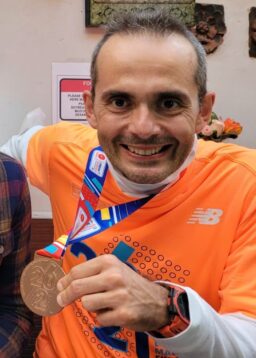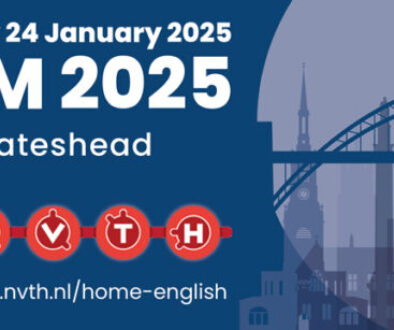Giordano sets personal best in London Marathon
Platelet Society member, Giordano Pula ran a fantastic London Marathon today, knocking a whole 5 mins off his marathon personal best.
A platelet scientist, now working in Germany, Giordano was selected to run the London Marathon on behalf of the Society following a search earlier in the year. Upon being offered the place Giordano said he was “excited to be able to combine his marathon running passion with that of a great cause”.

He spent late spring and throughout the summer training hard to put on the miles, building strength and endurance to prepare for the marathon distance. Acknowledging that he was not as young as he once was, an early hamstring injury caused a few delay to the training. But the benefit of his experience meant he was able to adapt the training and listen to what his body was telling him, and ensure that the hamstring didnt get any worse. As the distance increased, so did the injury niggles, but ultimately a sensible trainng schedule saw him preparing well.
During one of his updates, Giordano also highlighted the benefits of regular cardiovascular exercise to maintain a healthy cardiovascular system. He saw his resting heart rate decrease due to the effects of training, meaning his heart and blood was more efficient at getting oxygen around the body.

In the final weeks of training, Giordano adapted his training so that he could focus on decreasing the number of runs, but increasing the distance. He also travelled to Italy for a holiday and to enjoy running in the warmth and beauty of the Mediterranean.
Finally back in the UK, he successfully negotiated quarantine and testing under covid restriction and travelled down to London. It was time for race day!
Race Day
With Covid still very much on everyones mind, the race organisers had adapted the start of the marathon to minimise the size of running groups. A start time of 9.30 am on the blue route, saw Giordano cross the start line at 9.44 am. Getting off to a great start, the first 13.1 miles were run around an average pace of 7.42 per mile. This saw him passing famous London Landmarks such as Greenwich Park and the Cutty Sark before crossing the Thames via Tower Bridge with the Tower of London close by.
The route then turned away from the direction of the finish and headed out to the business district of Canary Wharf before turning back and starting the last 8 miles towards St James Park and the finish line. Giordano naturally slowed his pace as the race went by, but kept up an average pace of just under 8.00 per mile. Digging deep for the long run along the Thames Embankment, he turned past Westminster and along St James Park to the finish line on the Mall. Crossing the line in an official time of 3 hrs 34 mins and 12 seconds, Giordano smashed a full 5 minutes off his PB and proudly carried the flag for the Platelet Society.

After having cooled down, had a shower and got changed, Giordano met up with other Platelet Society members who had travelled down to London to support him. Still smiling (no doubt from the realisation that he wouldn’t have to get up and do a training run in the morning), and eating a hearty Italian meal, he reflected on the time.
Along his Journey Giordano has been supported by a range of people. We were delighted to obtain sponsorship from several companies. Thanks to Sysmex, Cellix, Intelligent Imaging Innovations and Labmedics whose support of Giordano, and the Platelet Soceity is much appreciated. His partner Lucia, who has been there to support him throughout the training, his friends and family, and of course, members of the Platelet Society. From posting Facebook, Instrgram and Twitter stories, to designing the logos and graphics many people have been there to support him.
And of course – to the people who have sponosored him. Thank you so much for your generosity.
There is still time to sponsor Giordano and support the work of the Platelet Society in supporting the research and education of platelet related diseases. Please click the button below to make a donation – small or large, the money will be used to support the study of platelets and their role in health and disease


























